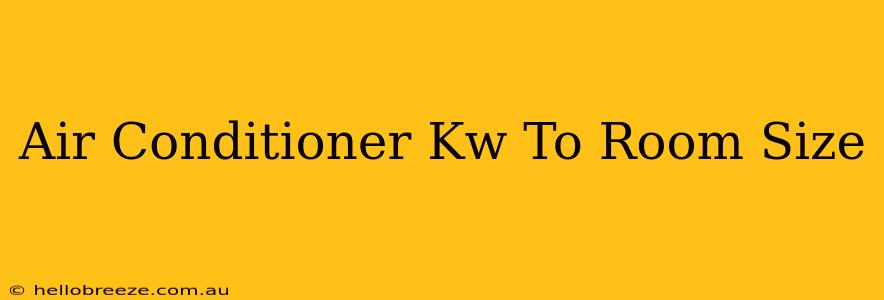Choosing the right air conditioner can be tricky. One of the most important factors to consider is the relationship between the air conditioner's power (measured in kilowatts, kW) and the size of the room it needs to cool. Getting this wrong can lead to an underpowered unit struggling to cool your space, or an overpowered unit that's inefficient and expensive to run. This guide helps you navigate the KW to room size relationship and find the perfect AC for your needs.
Understanding the Relationship Between KW and Room Size
The power of an air conditioner (in kW) directly impacts its cooling capacity. A higher kW rating generally means a more powerful unit capable of cooling larger spaces. However, it's not simply a direct 1:1 relationship. Several factors influence the ideal kW rating for your room:
- Room size: Larger rooms require more powerful AC units. This is the most obvious factor.
- Ceiling height: Higher ceilings mean more volume to cool, requiring a more powerful unit.
- Insulation: Well-insulated rooms lose less heat, requiring less powerful AC units. Poorly insulated rooms will require more powerful units to compensate for heat loss.
- Number of windows and doors: More windows and doors mean more potential heat gain, requiring a more powerful unit.
- Window size and orientation: Large windows, especially those facing the sun, allow significant heat gain.
- Climate: Hotter climates naturally require more powerful air conditioners.
- Number of occupants: More people in the room generate more heat.
- Appliances: Electronics and other appliances generate heat and increase the cooling load.
How to Estimate the Right KW for Your Room
There's no single magic formula to convert room size directly to kW. However, you can use these guidelines as a starting point:
- Small rooms (under 100 sq ft): A unit with a KW rating between 0.75 kW and 1.5 kW may suffice.
- Medium rooms (100-300 sq ft): A unit with a KW rating between 1.5 kW and 2.5 kW is generally appropriate.
- Large rooms (over 300 sq ft): You'll likely need a unit with a KW rating of 2.5 kW or higher.
Important Note: These are estimates. For a more accurate determination, consider using an online air conditioner BTU (British Thermal Units) calculator. BTU is another common unit for measuring cooling capacity, and many calculators can convert BTU to kW. You'll need to input the dimensions of your room, as well as other factors mentioned above (insulation, window size, etc.).
Don't Forget EER and SEER Ratings!
While KW indicates power, it doesn't tell the whole story. Consider the Energy Efficiency Ratio (EER) and the Seasonal Energy Efficiency Ratio (SEER). Higher EER and SEER ratings indicate more energy-efficient units, saving you money on your electricity bills in the long run. Prioritize higher EER and SEER ratings to minimize operational costs.
Choosing the Right Air Conditioner: Beyond KW
Selecting an air conditioner involves more than just KW and room size. Consider these additional factors:
- Type of air conditioner: Window units, portable units, split systems, and ductless mini-splits all have different features and suitability for various spaces.
- Features: Look for features like programmable timers, multiple fan speeds, and smart home compatibility.
- Noise level: Consider the noise level, especially if the unit will be located in a bedroom or quiet area.
- Installation: Some units require professional installation, while others are DIY-friendly.
- Budget: Set a budget before you start shopping. Prices vary widely based on features, brand, and type.
By carefully considering your room's characteristics, using online calculators, and understanding the factors beyond just KW, you can find the perfect air conditioner to keep you cool and comfortable.

